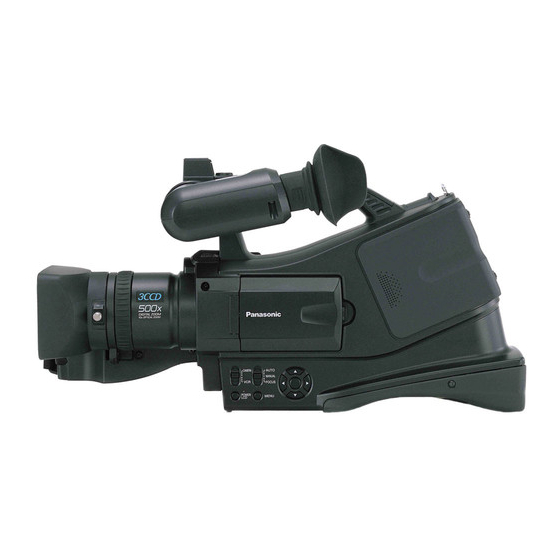Panasonic AGDVC20P - 3 CCD DV CAMCORDER Betriebsanleitung - Seite 4
Blättern Sie online oder laden Sie pdf Betriebsanleitung für Camcorder Panasonic AGDVC20P - 3 CCD DV CAMCORDER herunter. Panasonic AGDVC20P - 3 CCD DV CAMCORDER 40 Seiten. Agmini-dv camera/recorder
Auch für Panasonic AGDVC20P - 3 CCD DV CAMCORDER: Betriebsanleitung (42 seiten), Betriebsanleitung (42 seiten)

DVC20_Eng.book 4 ページ 2005年10月31日 月曜日 午前10時36分
Important Safeguards
13. Outdoor Antenna Grounding — If an outside
antenna or cable system is connected to the video
unit, be sure the antenna or cable system is
grounded so as to provide some protection against
voltage surges and builtup static charges. Part 1 of
the Canadian Electrical Code, in USA Section 810 of
the National Electrical Code, provides information
with respect to proper grounding of the mast and
supporting structure, grounding of the lead-in wire to
an antenna discharge unit, size of grounding
conductors, location of antenna discharge unit,
connection
to
grounding
requirements for the grounding electrode.
GROUND
CLAMP
ELECTRIC
SERVICE
EQUIPMENT
GROUND CLAMPS
POWER SERVICE GROUNDING
NEC – NATIONAL
ELECTRODE SYSTEM
ELECTRICAL CODE
(NEC ART 250, PART H)
14. Lightning — For added protection of this video unit
receiver during a lightning storm, or when it is left
unattended and unused for long periods of time,
unplug it from the wall outlet and disconnect the
antenna or cable system. This will prevent damage
to the video unit due to lightning and power-line
surges.
15. Power Lines — An outside antenna system should
not be located in the vicinity of overhead power lines
or other electric light or power circuits, or where it
can fall into such power lines or circuits. When
installing an outside antenna system, extreme care
should be taken to keep from touching such power
lines or circuits as contact with them might be fatal.
16. Overloading — Do not overload wall outlets and
extension cords as this can result in a risk of fire or
electric shock.
4
(continued)
electrodes,
and
ANTENNA LEAD IN WIRE
ANTENNA DISCHARGE UNIT
(NEC SECTION 810-20)
GROUNDING CONDUCTORS
(NEC SECTION 810-21)
17. Objects and Liquids — Never push objects of any
kind into this video unit through openings as they
may touch dangerous voltage points or short out
parts that could result in a fire or electric shock.
Never spill liquid of any kind onto the video unit.
18. Servicing — Do not attempt to service this video unit
yourself as opening or removing covers may expose
you to dangerous voltage or other hazards. Refer all
servicing to qualified service personnel.
19. Damage Requiring Service — Unplug this video unit
from the wall outlet and refer servicing to qualified
service personnel under the following conditions:
a. When the power-supply cord or plug is damaged.
b. If any liquid has been spilled onto, or objects have
fallen into the video unit.
c. If the video unit has been exposed to rain or
water.
d. If the video unit does not operate normally by
following the operating instructions.
Adjust only those controls that are covered by the
operating instructions, as an improper adjustment
of other controls may result in damage and will
often require extensive work by a qualified
technician to restore the video unit to its normal
peration.
e. If the video unit has been dropped or the cabinet
has been damaged.
f. When the video unit exhibits a distinct change in
performance – this indicates a need for service.
20. Replacement Parts — When replacement parts are
required, be sure the service technician has used
replacement parts specified by the manufacturer or
have the same characteristics as the original part.
Unauthorized substitutions may result in fire, electric
shock or other hazards.
21. Safety Check — Upon completion of any service or
repairs to this video unit, ask the service technician
to perform safety checks to determine that the video
unit is in safe operating order.
